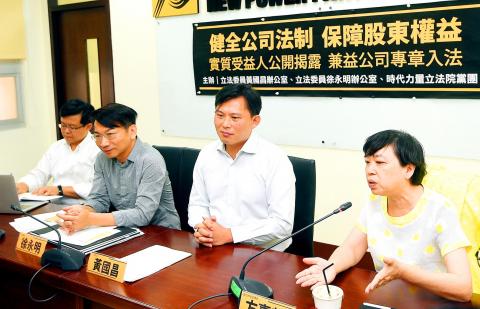The New Power Party (NPP) and civic group representatives yesterday called for rules requiring companies to disclose their beneficial owners and allowing minority shareholders to bring direct actions against board members ahead of a legislative review of draft amendments to the Company Act (公司法) planned for today.
While the Ministry of Economic Affairs has described the bill as an effort to meet international standards against money laundering ahead of a visit by the Asia/Pacific Group on Money Laundering (APG) in November, it could be more than that, NPP Executive Chairman Huang Kuo-chang (黃國昌) told a news conference in Taipei.
“This is an opportunity for Taiwan to build a new legal framework that is in line with global standards — one that is transparent, fair and beneficial to corporate governance, with better mechanisms to protect the rights of shareholders,” Huang said.

Photo: Fang Pin-chao, Taipei Times
Ensuring greater transparency about beneficial ownership is an important step toward achieving market transparency, which would allow the government to uncover illegal business operations, said National Chengchi University College of Law professor Faung Kai-lin (方嘉麟), who has been advocating reform of the act for nearly two years in cooperation with civic groups.
The Democratic Progressive Party (DPP) has refused to tighten rules on beneficial ownership, saying that it does not want to create “unnecessary trouble” for companies, but for 99 percent of companies, registering their beneficial owner would take only five seconds, he said.
“The remaining 1 percent that deliberately try to conceal their beneficial owner would complain about the additional hassle, but without greater transparency about beneficial ownership, Taiwan will probably not pass the APG evaluation,” he added
The draft amendments should also allow minority shareholders to bring direct actions against board members who have violated regulations or encroached upon their rights, National Taipei University law professor Chen Yen-liang (陳彥良) said.
That would not only improve protection of minority shareholders’ rights, but also allow them to act as watchdogs alongside independent directors, he said.
The legislature should use the opportunity of reviewing the act to push for more comprehensive reform, as such opportunities are rare, NPP caucus convener Hsu Yung-ming (徐永明) said, adding that lawmakers should not take half measures.
While the Chinese Nationalist Party (KMT) respects the NPP’s proposals, legislators must distinguish between ideals and reality, KMT caucus secretary-general Lee Yen-hsiu (李彥秀) said.
During the review, the KMT would seek a reasonable balance between government supervision and business practice, she said, urging other parties to also handle the bill with caution.
The DPP supports the draft amendments proposed by the Executive Yuan, but would make minor adjustments based on the results of cross-caucus negotiations, DPP caucus secretary-general Hsu Chih-chieh (許智傑) said.
Additional reporting by CNA

Chinese Nationalist Party (KMT) Chairman Eric Chu (朱立倫), spokeswoman Yang Chih-yu (楊智伃) and Legislator Hsieh Lung-chieh (謝龍介) would be summoned by police for questioning for leading an illegal assembly on Thursday evening last week, Minister of the Interior Liu Shyh-fang (劉世芳) said today. The three KMT officials led an assembly outside the Taipei City Prosecutors’ Office, a restricted area where public assembly is not allowed, protesting the questioning of several KMT staff and searches of KMT headquarters and offices in a recall petition forgery case. Chu, Yang and Hsieh are all suspected of contravening the Assembly and Parade Act (集會遊行法) by holding

PRAISE: Japanese visitor Takashi Kubota said the Taiwanese temple architecture images showcased in the AI Art Gallery were the most impressive displays he saw Taiwan does not have an official pavilion at the World Expo in Osaka, Japan, because of its diplomatic predicament, but the government-backed Tech World pavilion is drawing interest with its unique recreations of works by Taiwanese artists. The pavilion features an artificial intelligence (AI)-based art gallery showcasing works of famous Taiwanese artists from the Japanese colonial period using innovative technologies. Among its main simulated displays are Eastern gouache paintings by Chen Chin (陳進), Lin Yu-shan (林玉山) and Kuo Hsueh-hu (郭雪湖), who were the three young Taiwanese painters selected for the East Asian Painting exhibition in 1927. Gouache is a water-based

Taiwan would welcome the return of Honduras as a diplomatic ally if its next president decides to make such a move, Minister of Foreign Affairs Lin Chia-lung (林佳龍) said yesterday. “Of course, we would welcome Honduras if they want to restore diplomatic ties with Taiwan after their elections,” Lin said at a meeting of the legislature’s Foreign Affairs and National Defense Committee, when asked to comment on statements made by two of the three Honduran presidential candidates during the presidential campaign in the Central American country. Taiwan is paying close attention to the region as a whole in the wake of a

OFF-TARGET: More than 30,000 participants were expected to take part in the Games next month, but only 6,550 foreign and 19,400 Taiwanese athletes have registered Taipei city councilors yesterday blasted the organizers of next month’s World Masters Games over sudden timetable and venue changes, which they said have caused thousands of participants to back out of the international sporting event, among other organizational issues. They also cited visa delays and political interference by China as reasons many foreign athletes are requesting refunds for the event, to be held from May 17 to 30. Jointly organized by the Taipei and New Taipei City governments, the games have been rocked by numerous controversies since preparations began in 2020. Taipei City Councilor Lin Yen-feng (林延鳳) said yesterday that new measures by